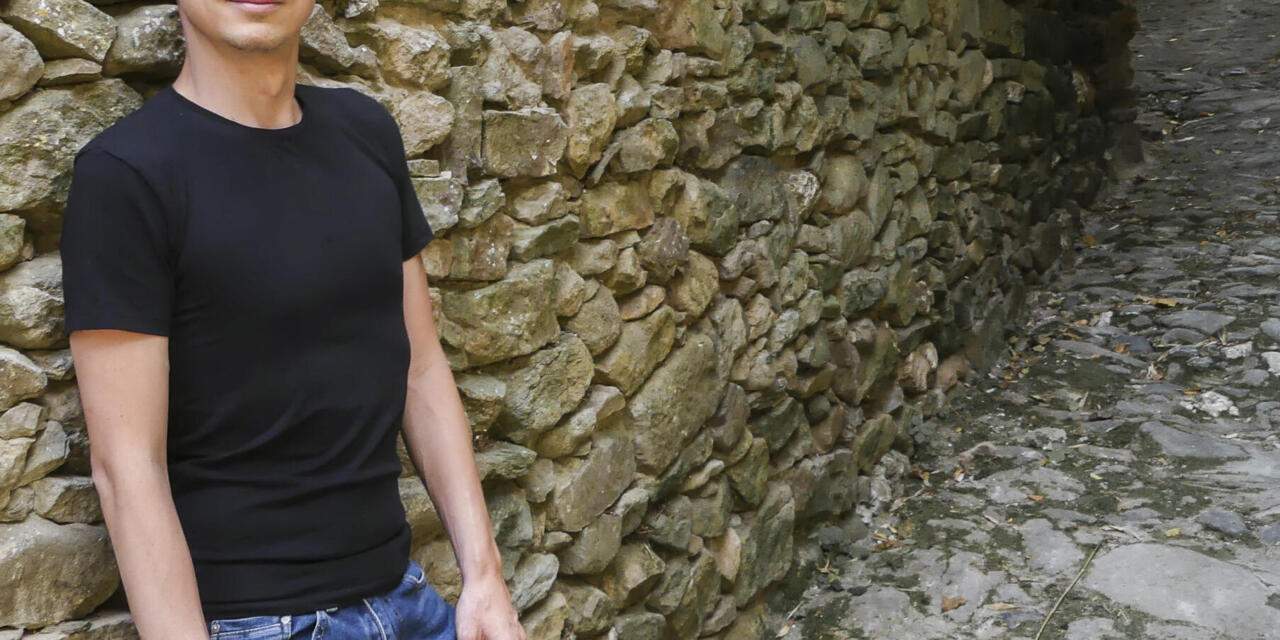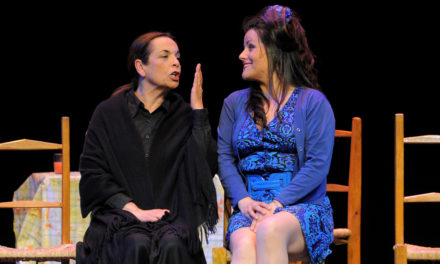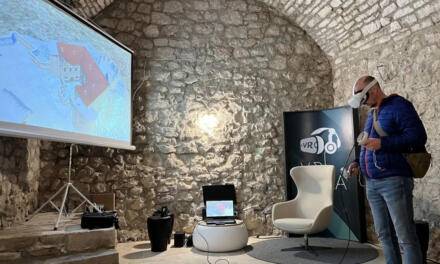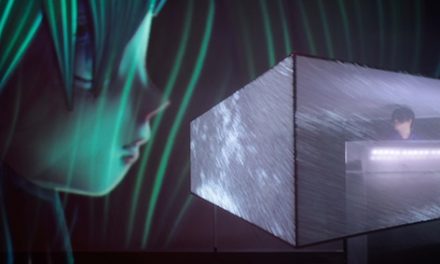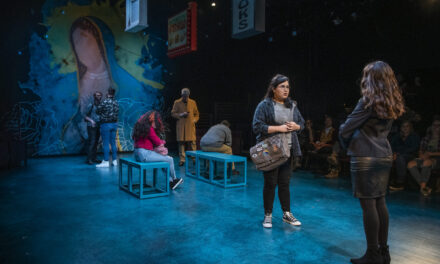Alberto Conejero Lopez is a Spanish playwright and director, who has published or premiered more than a dozen dramatic texts, including Cliff (acantilado), Hungarians and Fever.
Please tell us a story from your childhood that helps us understand who you are as a playwright.
All the stories my maternal grandfather told me. He was a shepherd in a country estate called Casablanca in Jaen, Spain, and lost a leg during the Civil War. Also, all the stories while I was in high school on the outskirts of Madrid in the 90s, where we had teachers speaking lovingly about ‘The Iliad’ while outside heroin use raged among the children of the workers.
Todas las historias que contaba mi abuelo materno, que fue pastor en un cortijo de Jaén llamado Casablanca, y que perdió una pierna por las heridas durante la Guerra Civil; y todas las historias del extrarradio de Madrid en los 90, del instituto, donde hubo profesores que nos hablaban con amor de la Ilíada mientras fuera la heroína causaba estragos entre los hijos de los obreros.
What’s the first hook that gets a new play started for you? Is it an image, a theme, a memory, a character?
There are many different triggers. Some plays were born after an image loaded with tension and mystery. In other plays it has been a particular issue, a question for which I have no answer and can only be raised in the theatre. I think that every play is built on memory and the memory game: imagination.
Hay disparadores muy diferentes. Algunas obras nacieron de una primera imagen, cargada ya de tensión y de misterio. En otras ha sido un tema concreto, una pregunta para la que yo no tengo respuesta y que sólo puedo plantear desde el teatro.Creo que toda obra está sustentada sobre el recuerdo y el juego con ese recuerdo: la imaginación.
What play, by another author, do you wish you had written?
Return to the Desert by Bernard-Marie Koltès
Regreso al desierto de Bernard-Marie Koltès
Can you describe what you look for in a director?
Poetic ambition, a perspective that builds from generosity, and an understanding of the theatrical creation as a collective task in which no element is subsidiary or instrumental. I look for someone who understands the importance of the word in action, the importance of the infinite mystery of the word on a stage. Someone who loves language and actors.
Que tenga ambición poética, que tenga una mirada que construya desde la generosidad y entienda la creación teatral como una tarea colectiva en la que ningún elemento es subsidiario o instrumental. Que entienda la importancia de la palabra en acción, del misterio infinito de la palabra en un escenario. Que ame el lenguaje y que ame a los actores.
How have you seen the role of theatre change in society over the course of your life?
During the early years of my career, for me, theater was more related to literature, it was an almost individual practice, focused on the texts. Now, for me, theater is mainly a political place, belongs to the “polis”. Theatre must give to the “polis” the joy of a unique poetic experience while questioning us about our present as individuals and citizens.
Durante los primeros años, para mí el teatro estaba más ligado a la literatura, era una práctica casi individual, centrada en los textos. Ahora para mí el teatro es un lugar eminentemente político, pertenece a la polis, a ella debe entregarle la dicha de una experiencia poética excepcional y que nos interrogue sobre nuestro presente como individuos y ciudadanos.
What do you think are the main obstacles that playwrights face to getting produced today?
The places of reflection and thinking are living in a time of persecution, and the theater is not free from this persecution. Those who should be the guarantors of culture are carrying out policies that seem to seek their destruction. If playwriting has always been a work of resistance and persistence, now it is even more so. The living playwright has been one of the weakest parts of a gear now also harassed. Another huge obstacle we face is the de facto censorship established by the exhibition and production systems, fashion and the resulting self-censorship: from number of characters to the subject of the play. This is the biggest difficulty: that the creative truth demands a production instead of the truth of the production demanding a particular type of creation.
Vivimos una situación de acoso y derribo de los lugares de reflexión y de pensamiento de la que el teatro no se está librando. Los que debieran ser los garantes de la cultura están llevando a cabo políticas que parecen buscar su destrucción. Si la dramaturgia siempre ha sido un oficio de resistencia, de persistencia, ahora lo es más. El dramaturgo (vivo) ha sido de las partes más débiles de un engranaje ahora además acosado. La censura de facto que establecen los sistemas de exhibición y producción, las modas y la autocensura consiguiente: desde el número de personajes a la temática. Ésa es la mayor dificultad: que sea la verdad creativa quien demande una producción y no la verdad de la producción la que demande cierto tipo de creación.
What advice would you give a playwright just starting out?
I am not in a place to give advice. I just know that a playwright must read (theater, yes, but not just theater) and go to the theater as much as possible; they also should be around actors in every possible way and look from the beginning for the necessary accomplices; accept commissions because they are an opportunity for growth and estrangement. Be obsessed with Shakespeare. Sit down in empty theaters to imagine, to write in that silence, in that infinity.
Yo no estoy en disposición de dar consejos. Sólo sé que un dramaturgo tiene que leer (teatro, sí, pero no sólo teatro) e ir al teatro todo lo que pueda; que se relacione con actores de todos los modos posibles y que busque desde el principio a los cómplices necesarios; que acepte los encargos porque son ocasión de extrañamiento y de crecimiento. Que se obsesione con Shakespeare. Que se siente en los teatros vacíos a imaginar, a escribir en ese silencio, en esa infinitud.
If you could institute one theatre law, what would it be?
I believe that theater should be part of the educational program, and, as such, it should have a central place in the education of our youth, like music, mathematics or philosophy. It is a disaster that in the country of Lope de Vega, Calderon and Garcia Lorca, theater would have a marginal presence (and this is an understatement) in education. Besides the cultural VAT in Spain and its impact on the theatrical profession is one of the most unpatriotic things a government can do.
Creo que el teatro debería formar parte de la enseñanza, que debería tener un lugar fundamental en la formación de nuestros jóvenes, al igual que la música, las matemáticas o la filosofía; que en el país de Lope de Vega, Calderón o García Lorca el teatro tenga una presencia marginal (y esto es un eufemismo) en la educación es un desastre. Además el IVA cultural en España y sus consecuencias en la profesión teaatrales de lo más antipatriótico que puede hacer un gobierno.
What type of theatre do you enjoy attending most as an audience member?
Any piece made with truth and dedication. From a good musical to a piece of physical theater and of course the text theater. It is hard for me to understand how someone who really loves the theater can have prejudices seeing a Sondheim musical or how can someone turn from genres such as comedy or say that classical theatre does not say anything to them or that opera is rotten or that a classic structure is a sign of an elderly drama. You have to be promiscuous as spectators.
Todo aquel hecho con verdad y entrega. Desde un buen musical, a una pieza de teatro físico y por supuesto el teatro de texto. Me cuesta entender cómo alguien que ame realmente el teatro pueda sentir prejuicios a la hora de ver un musical de Sondheim o que reniegue de géneros como la comedia o que diga que los clásicos no le dicen nada o que la ópera es carcoma o que una estructura clásica es señal de una dramaturgia envejecida. Hay que ser promiscuo como espectadores.
If you were to write your own epitaph, what would you say?
I don’t want to reply to this question. For superstition, obviously.
No quiero responder a esta pregunta. Por superstición, claro.
Alberto Conejero Lopez (Jaén, Spain, 1978) received his Bachelor’s degree in Stage Direction and Playwriting from the RESAD in Madrid, and his doctorate from the Complutense University of Madrid. He completed his training as a playwright in courses and seminars with Juan Mayorga, Marco Antonio de la Parra, and Alejando Tantanian, among others. He has published or premiered more than a dozen dramatic texts, including: Cliff (acantilado): winning text of the 4th LAM Prize, 2010, published by the Author Foundation in 2011 and premiered in Buenos Aires in 2012, directed by Alejandro Tantanian; Hungarians: text chosen for the 11th Festival of Contemporary European Dramaturgy of Chile, 2011, National University Theater Prize of Spain, 2000, and published in the journal Primer Acto; Fever, runner up in the National Short Theater Prize of Spain, 1999, published by Edisena, Valencia.
He has also been responsible for various translations and adaptations: Woodworm, based on Plautus”s Curculio, which premiered in the Imperdible Theater of Seville in the year 2000; William Shakespeare’s Macbeth and The Tempest for the company Theater in the Background (national tour in 2009 and 2010, respectively); Pilgrims’Altarpiece, based on texts by Federico García Lorca, Valle-Inclán, and Jacinto Alonso Maluenda for The Fingerprints of La Barraca 2010, with a presence at the most prestigious festivals of classic theater including Olmedo and Olite; the stage version of Lope de Vega’s El premio del bien hablar for Valquiria Theater; Gil Vicente’s La barca del infierno for TeatroDan, and Frankenstein in the Arenal Theater for Tamir Theater, both in 2012. He has given talks and taught classes on contemporary European dramaturgy and classic theater in Spain, Hungary, Greece, Chile, Argentina, and Uruguay.
This post was written by the author in their personal capacity.The opinions expressed in this article are the author’s own and do not reflect the view of The Theatre Times, their staff or collaborators.
This post was written by Mara Valderrama.
The views expressed here belong to the author and do not necessarily reflect our views and opinions.

